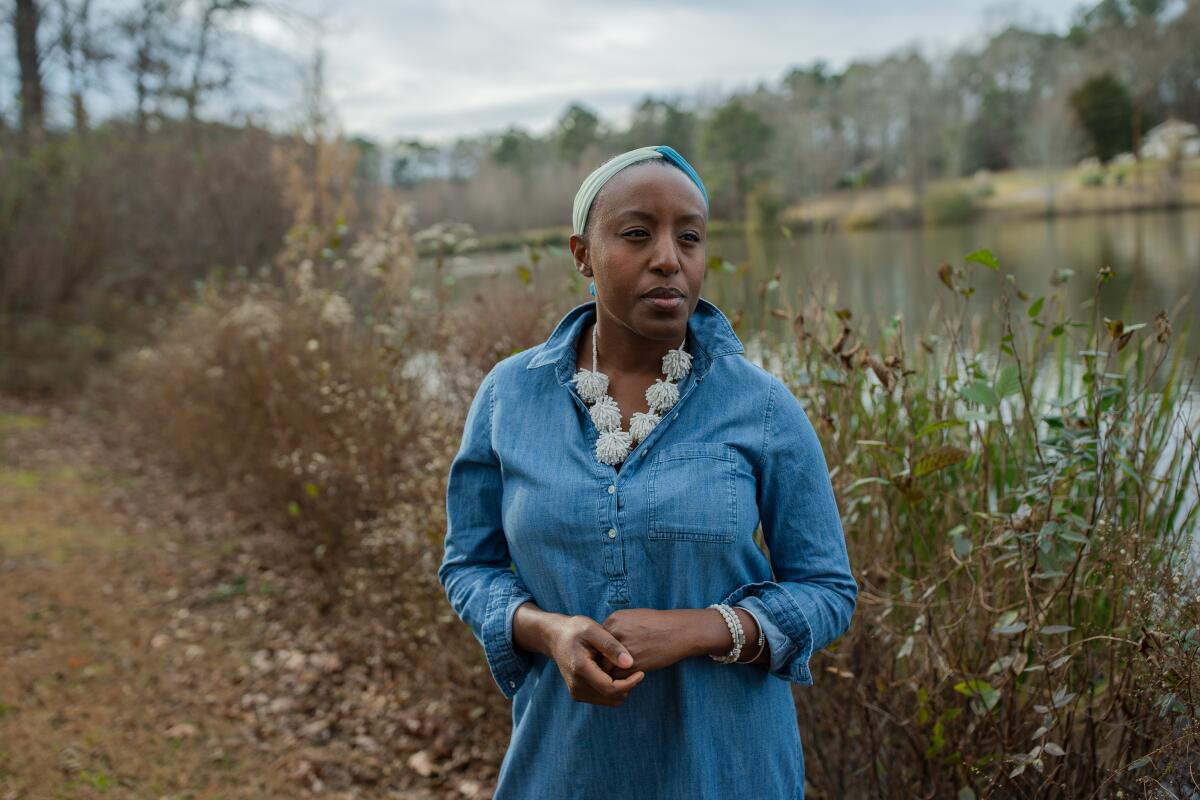Georgia’s political change came fast but has deep roots

- Share via
STOCKBRIDGE, Ga. — As a child in rural, 1950s Georgia, Ralph Evans early on learned the rules of Jim Crow.
“When you were dealing with the white race, you had no standing,” the 72-year-old Evans said. “It was Blacks within their area and whites within their area, and the two lines did not meet.”
In his 20s, when he got out of the military, Evans didn’t return to Georgia, instead following a well-blazed path to Detroit, where he worked for his older brothers, before eventually settling in the San Francisco Bay Area.
He worked as a criminal investigator for the Treasury Department, raised three children and sent a daughter, Dana, to UCLA and another, Kesha, to Berkeley, but never felt entirely at home in California.
“I never really was away” from Georgia, he said. “Physically, yes, but I was always attached mentally. It’s always been home.”
When the time came to retire, the pull of family and friends, the lower cost of housing and the ties of memory drew him back South, where he settled in fast-growing Henry County, half an hour south of Atlanta’s restaurants and malls. In 2008, Evans and his wife, Alice, bought a 4,500-square-foot, four-bedroom brick home overlooking a lake in an upscale subdivision with a clubhouse and tennis courts.

They were part of a wave that was transforming the county and has now shifted the balance of the nation’s politics.
President-elect Joe Biden’s November victory in Georgia by fewer than 12,000 votes depended on his dominance in places like Henry County, where he won nearly 60% of the vote. No county in the nation had as large a swing to the Democrats between 2016 and 2020 as this growing swath of suburbia, according to data analyzed by TargetSmart, a Democratic vote-targeting firm.
Georgia’s election this year also marked the first time in any state since the Reconstruction era of the 1870s that “the majority of [the winning presidential] candidate’s coalition was Black voters, not white voters,” said Bernard Fraga, a political science professor at Emory University in Atlanta.
“The largest group in Biden’s coalition was African Americans in Georgia,” he said. “That’s never happened.”
In just over a week, Democratic hopes of winning control of the Senate will rise or fall on whether the party’s candidates in twin runoff elections can repeat that pattern. Polls show both races are tight. Statewide data on early voting so far show Black voters making up a larger share of the vote than they did at this point in early voting for the general election, an encouraging sign for Democrats.
Religion has taken on new meaning in this heated political season amid the Georgia Senate runoff races, where a Black pastor from Martin Luther King Jr.’s church is on the ballot.
The degree of Biden’s success in Henry County caught many political observers by surprise.
“I expected it to be much closer,” said Emanuel Jones, the Black Democratic state senator whose district includes the county. “We were praying that we got to 54%.”
But while the change in the state’s politics bloomed faster than many expected, its roots are deep, growing out of a generation-long trend of migration back to the South — and to the Atlanta metropolitan region in particular — by hundreds of thousands of Black families.
That reflects a crucial pattern in American politics, said Keneshia Grant, a political scientist at Howard University in Washington, D.C.

“Migration has been especially important to the story of Black participation in American politics,” said Grant, author of “The Great Migration and the Democratic Party,” a book that traces the significant expansion of Black political influence resulting from large numbers moving to Northern cities from the end of World War I through the 1960s.
As that pattern of northward migration began to reverse, Atlanta emerged in the 1990s as the largest destination for Black Americans, a trend that accelerated through the early 2000s.
“In the same way that the Great Migration is a long story, this return migration is also a long story,” Grant said. “When you want to understand what’s happening in Georgia in 2020, you have to look at it as the result of something much longer.”
Many factors have gone into the shift in Georgia’s politics, including the intensive voter registration and mobilization campaigns led by Stacey Abrams, the Democratic Party’s 2018 candidate for governor, who is widely expected to run again in 2022. Those campaigns, however, could succeed only with the changes in the state’s population.

In 2000, Black residents made up just one-seventh of the population in Henry County, which remained largely rural. By the time Ralph and Alice Evans bought their home 12 years ago, the county’s population had grown by more than 60%, and Black residents were one-third of the total.
When their daughter Dana Evans, 43, joined them two years ago to help care for an ailing Alice, the county’s Black population had more than quintupled since 2000, in large part because of migration from other states. White residents now make up less than half of the county’s population.
Across the 10-county Atlanta region, that pattern of racial diversification is increasingly the case, as is the resulting political change. Rockdale County, one of Henry County’s neighbors to the east, had the second-biggest Democratic shift of any county in the nation in 2020. Of the 20 counties nationwide with the biggest swings toward Democrats, seven were in Georgia.
Get our L.A. Times Politics newsletter
The latest news, analysis and insights from our politics team.
You may occasionally receive promotional content from the Los Angeles Times.
Although many political analysts thought North Carolina — a state that Barack Obama carried in 2008 — provided Democrats’ best shot at making a breakthrough in the Southeast, Georgia had “a little bit more of each of the components that make things favorable to Democrats,” said Tom Bonier, the head of TargetSmart: It had a larger share of Black voters, more college-educated white voters and a population that is more urban and, on average, younger.
Between 2000 and 2019, Georgia added 920,000 Black voting-age residents, according to data from the nonpartisan Pew Research Center. Of this year’s battleground states, Georgia’s electorate had by far the largest share of Black voters, roughly one-third, compared with about one-fifth in North Carolina and one-eighth in Michigan, Pew found.
With Georgia’s Latino and Asian voter populations also growing, the white share of the state’s voters has dropped by 11 percentage points since 2000.
In addition to being largely people of color, recent migrants to the state are overwhelmingly college-educated, with 87% of the new voting-age residents since 2010 having at least a bachelor’s degree, said Andrew Lim of New American Economy, a research and advocacy group funded by former New York Mayor Michael R. Bloomberg.
“That was a huge change” for a state where, until recently, fewer than one-third of the voters were college-educated, Lim said.
“Georgia, and Atlanta in particular, has built a reputation as a place for young professionals to go that’s lower-cost” than the Northeast or the West Coast, Lim said. A four-bedroom house can still be purchased for under $250,000 across many of the southern counties of metro Atlanta. The Atlanta area is also widely seen as welcoming to Black families, which has been crucial for many contemplating a move to the South.
Led by California Atty. Gen. Xavier Becerra, tapped to lead the Health and Human Services Department, Biden’s healthcare team is aiming for an ambitious agenda to reshape a healthcare system that still leaves millions of Black and Latino Americans with weaker insurance protections, less access to care and poorer outcomes.
The movement has changed politics locally as well as nationally. In November, Henry County voters elected their first Black sheriff.
“It’s been a slow, systematic change in leadership,” said Reginald Scandrett, the new sheriff, who ran on a platform of reducing recidivism and building public trust in law enforcement.
“People have been consistently challenged and hurt and frustrated,” he said. “I think people are begging for change and just think it’s time go in a fundamentally different direction.”
To Shereda Jeffries, 42, an elementary school teacher who grew up in Savannah and moved to Henry County in June, Scandrett’s election came as a sign of people’s growing desire for new leadership after the nationwide protests this summer against racism and police brutality.
“I don’t think Georgia’s changed,” she said. “I think it’s changing.”
The shift in political power is also sparking a reevaluation of Georgia’s racist past. This summer, the Henry County Board of Commissioners voted to remove a statue of a Confederate soldier that had stood for more than a century in the town square in the county seat of McDonough.
And local leaders have taken steps to celebrate the county’s Black political history, renaming a bridge and establishing a heritage trail in honor of the Rev. Martin Luther King Sr., the father of the civil rights leader. The elder King was born and raised in Stockbridge before moving to Atlanta, where he became pastor of Ebenezer Baptist Church.

Even so, when Dana Evans, an interior designer, and her husband and three children moved from the Washington suburb of Bethesda, Md., to join her parents, she initially felt she had entered a different world. As she drove out of their upscale subdivision, she passed ranch homes with Trump signs in their front yards.
There was less political consensus among white and Black residents, she said, than in liberal cities like Los Angeles or Atlanta or her previous home in the D.C. suburbs.
“There’s such a hard political divide nowadays,” she said. “Here you feel like you leave the subdivision and your neighbor maybe hates you. And that’s weird.”
But Stockbridge, she soon discovered, was also the Blackest city she had ever lived in. For the first time, her two young daughters and son were surrounded by other Black children when they took swimming and tennis classes. All their instructors were Black too.
“If I placed a pin on a map, this would not have been it,” she said. “But I get it now; I understand that concept of cost of living. I want stability for my children.”
When Biden won, Evans felt she‘d had a political impact in a way she never had before.
“In Maryland, in D.C., my vote meant nothing, right?” she said. “Here I get to tell my people in D.C. I made the difference.
“They said it was Stacey Abrams. I said, ‘No, it was me. I moved here. I made the big change.’”
More to Read
Get the L.A. Times Politics newsletter
Deeply reported insights into legislation, politics and policy from Sacramento, Washington and beyond. In your inbox twice per week.
You may occasionally receive promotional content from the Los Angeles Times.














